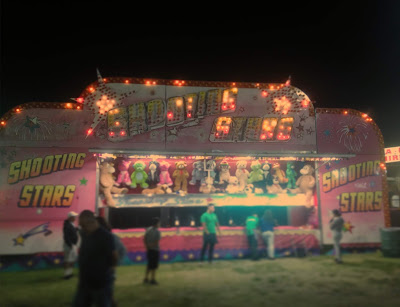no one is free when others are tethered
One evening back in the fall, I pushed Dash around Highland
Park in his stroller. A carnival had sprung up like a cluster of toadstools in
the park next to the library. The lights blurred in the fog and paint peeled
from the signs on the rides and exhibitions. It felt like we were in 1992, or
1955, or 1890. The carnival was crowded with families and packs of teenagers
and couples with their hands in each other’s back pockets, but I was the only white
person I saw the whole time. The sense of witnessing a ghost Highland
Park, a fading twin of the mixed, gentrifying neighborhood it is in
daylight, was palpable and eerie.
Us opens on the
Santa Cruz boardwalk in 1986, when a little Black girl named Adelaide wanders
into a funhouse called Shaman’s Vision and returns shell-shocked and changed
forever.
In the present day of the film, it has been renamed Merlin’s
Forest, presumably because we don’t appropriate Native American culture anymore. That’s
all in the past, right?
Adelaide (Lupita Nyong’o) tells her husband what happened that day: She saw a little girl who looked exactly like her, and she’s always had the foreboding feeling that the girl is coming for her.
These opening scenes, of Adelaide moving through her
family’s sunny beach vacation steeped in dread, felt a lot like the past two
weeks of my life. If you think that’s an exaggeration, you haven’t met PTSD. I had my semi-annual cancer checkup right on the heels of
Molly’s death, and everything I hoped I’d left behind reared up. It rattled my
door and stood in my driveway, creepy as a family of clones in red jumpsuits.
Spoilers ahead. Spoilers are how we know we lived to tell
the tale.
The family of doppelgangers takes Adelaide and her husband and two children hostage. Red, her double and the only Other who talks, explains in a deep, halting voice that she and her kind live underground, their bodies separate but their souls tethered to the humans above ground: the ones enjoying roller coasters and candy apples and epidurals during childbirth. Meanwhile, the Tethered subsisted on raw rabbit meat and never saw the sun. Who are these people?
“We’re Americans,” says Red.
The film turned for me in that moment, from a terrifying but
personal tale of PTSD to a social story—more poetic, less spikily scary, but
more horrifically wide-reaching in its implications.
The central metaphor of Us
is that if America doesn’t face its past and present—of slavery and
oppression, of carnival rides on the backs of humans whose suffering we
conspire to make invisible—it will come for us and tear us down.
But here’s the twist (more spoilers): As we relive the
Shaman’s Vision quest through Red’s eyes, we learn what really happened that
day. The girl from the world above was dragged underground, and the Tethered
girl went to live in the sunshine. The Adelaide we’ve been rooting for, the one
willing to fight to the death for her children, is the changeling.
But she isn’t some evil witch in disguise. She is, basically, a kid who leaves a rough neighborhood for a good job in corporate America. She wants what everyone wants, but she knows whom she left behind, and she doesn’t have the luxury of blindness to the Tethered. Meanwhile, Red—as the once-loved child who longs for what she lost—has to be the one to lead the revolution. You can’t summon the appropriate rage if you don’t know what you’re missing.
Adelaide’s fear strikes me as a kind of survivor guilt. She
knows—in her bones and blood and hair follicles—that she’s no different from
the Tethered. Of course, I don’t have Molly’s blood on my hands in the way that
white people have Black, Brown, Asian, and Indigenous blood on our hands. But
I know that the difference between a good outcome and a life cut short is as
arbitrary as a flipped mirror. I know how much of my energy and anyone’s is
devoted to maintaining the fictions that say otherwise.
As in Get Out, Jordan
Peele reveals the terror inflicted on Black
bodies and souls as particular, visceral grief. The howling rage, sadness, and cautionary bleakness of Us feels truer than any documentary.







Comments